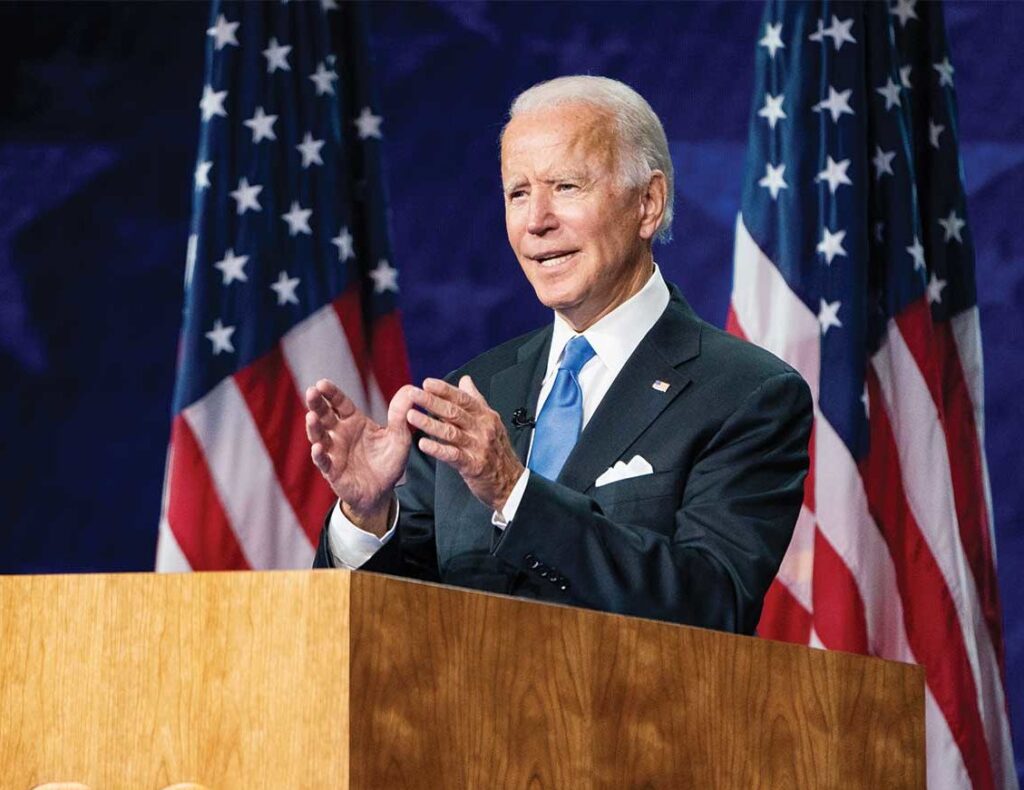Biden, Harris headline Dems’ ‘unconvention’
Biden’s rhetoric calls on Democrats to take the high road in presidential race

Joe Biden opened up his acceptance speech at last week’s virtual Democratic National Convention by praising Ella Baker and summoning a nation wearied by division and strife to follow her call.
The presidential nominee said Baker, “a giant of the civil rights movement … left us with this wisdom: ‘Give people light and they will find a way.’”
“These are words for our time,” said the former vice president, speaking from an event hall in his home state of Delaware on the last night of the convention. “The current president has cloaked America in darkness for much too long. Too much anger. Too much fear. Too much division.”
The coda to his opening remarks lay down his electoral challenge in near-Biblical terms, underscoring the contrast between his genial, consensual brand of leadership and the divisive, racially inflammatory tone of President Donald Trump.
“Here and now,” said Biden, standing in front of a phalanx of American flags, “I give you my word: If you entrust me with the presidency, I will draw on the best of us, not the worst. I will be an ally of the light, not of the darkness. It’s time for us, for ‘We the People,’ to come together.”
By invoking Baker, who made, as the late John Lewis would say, “good trouble” by standing up to party bosses at the 1964 convention on behalf of the Mississippi Democratic Freedom Party, Biden sent an affirming message to young Black and brown voters following in Baker’s activist footsteps. His reference also appealed to older party supporters moved by memories of Baker’s selfless organizing and mentoring work with leaders of the NAACP, the Southern Christian Leadership Conference and the Student Non-Violent Coordinating Committee.
In accepting the party mantle to challenge President Donald Trump in November, the 77-year-old nominee clearly signaled his intention to depend heavily on Black voters, who fueled his remarkable primary comeback, to make the incumbent the first one-term president since George H.W. Bush lost to Bill Clinton in 1992.
The prominent convention speaking role given to Biden’s former White House boss, President Barack Obama, ensured that viewers would get the memo: This is not the Hillary Clinton campaign.
Capping off the messaging, explicit and implicit, was the appearance of Biden’s running mate, Kamala Harris, the first woman of color ever named to a major party ticket, on the night before Biden’s speech.
In a rousing address, the 55-year-old California senator underscored the historic nature of her partnership with Biden, citing a list of trailblazing heroes who paved the way for a child of immigrants from Jamaica and India to serve one heartbeat away from the world’s most important office.
“This week marks the 100th anniversary of the passage of the 19th amendment. And we celebrate the women who fought for that right,” said Harris. “Yet so many of the Black women who helped secure that victory were still prohibited from voting, long after its ratification.”
“Without fanfare or recognition,” Harris added, “they organized, testified, rallied, marched and fought – not just for their vote, but for a seat at the table.”
The leaders she cited – Mary Church Terrell, Mary McLeod Bethune, Fannie Lou Hamer, Diane Nash, Constance Baker Motley and Shirley Chisholm – are not household names in most American domiciles, but they ring out like family history to African Americans.
Harris also emphasized the inclusive nature of her vision for America and shared the story of her upbringing by a single mother in the Bay Area, where Harris made a mark as a prosecutor before winning election as state attorney general and U.S. senator.
“When I was 5, my parents split and my mother raised us mostly on her own,” said Harris. “Like so many mothers, she worked around the clock to make it work – packing lunches before we woke up, and paying bills after we went to bed. Helping us with homework at the kitchen table – and shuttling us to church for choir practice.”
But while paying attention to maternal duties, her mother “also pushed us to see a world beyond ourselves,” said Harris.
“She taught us to be conscious and compassionate about the struggles of all people. To believe public service is a noble cause and the fight for justice a shared responsibility. That led me to become a lawyer, a district attorney, attorney general and a United States senator. And at every step of the way, I’ve been guided by the words I spoke from the first time I stood in a courtroom: ‘Kamala Harris: For the People.’”
While Biden and Harris provided the emotional highlights of the convention in their mix of moving personal stories and policy battles for “the soul of America,” Obama served up a cerebral evisceration of the current White House occupant in his remarks.
Speaking from a darkened hall in Philadelphia in the shadow of the buildings where the Declaration of Independence and the U.S. Constitution were signed, Trump’s two-term predecessor spoke soberly of the threat the incumbent and his enablers pose to the Republic.
“Do not let them take away your power,” said Obama. “Don’t let them take away your democracy.”
For the last four years, he said, Trump “has shown no interest in putting in the work; no interest in finding common ground; no interest in using the awesome power of his office to help anyone but himself and his friends; no interest in treating the presidency as anything but one more reality show that he can use to get the attention he craves.”
Notably, the former president didn’t veer into a Bill Clinton-like defense of Biden’s policy choices nor tear apart Trump’s – his target was Trump’s character, which he broke down coolly and clinically as he laid out the impact of the White House’s faltering leadership during the COVID-19 crisis.
“Donald Trump hasn’t grown into the job, because he can’t,” said Obama. “And the consequences of that failure are severe. One hundred and seventy thousand Americans dead. Millions of jobs gone, while those at the top take in more than ever. Our worst impulses unleashed, our proud reputation around the world badly diminished, and our democratic institutions threatened like never before.”
The virtual confetti had barely fallen on the Democratic gathering before the GOP came together on Monday to begin their four-day convention, headlined each day by the president.
Looking ahead to November, Biden in his closing remarks echoed, like a good Gospel song, his notes from the opening: “May history be able to say that the end of this chapter of American darkness began here tonight, as love and hope and light joined in the battle for the soul of the nation.”






